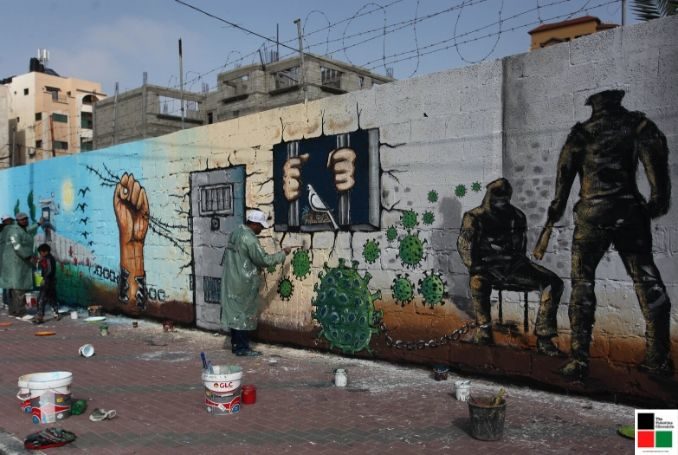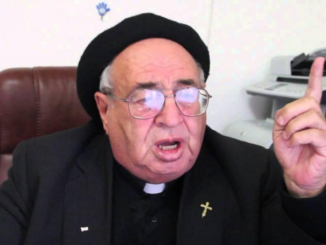
Israel’s Supreme Court rejected yesterday a petition by Adalah, The Legal Center for Arab Minority Rights in Israel, demanding Israeli authorities to implement COVID-19 protective guidelines for prisoners at Gilboa prison, where 30 prison guards and seven Palestinian prisoners are infected, while 489 guards and 58 prisoners are in quarantine.
The court ruled late on Thursday evening that Palestinians held in Israeli prisons have no right to social distancing protection against the COVID-19 pandemic, said Adalah in a press statement.
Earlier on the day, the court had convened to hear a petition filed by Adalah demanding that the Israel Prison Service (IPS) and Israel’s Public Security Ministry take all necessary actions to avoid a COVID-19 outbreak among the 450 prisoners – overwhelmingly Palestinian political prisoners – in the overcrowded Gilboa prison.
.@AdalahEnglish slammed an Israeli Supreme Court decision against social distancing in Israeli prisons: “Palestinian prisoners have no right to protection against COVID-19.”https://t.co/suzLRbM08f
— Mondoweiss (@Mondoweiss) July 24, 2020
Adalah Attorney Myssana Morany, who submitted the petition on behalf of the families of two Palestinian prisoners, responded to the ruling by the top Israeli court: “Israel’s Supreme Court has chosen to accept the fiction pitched to it by Israeli authorities that COVID-19 social distancing policies – essential for everyone else – are not relevant to the Palestinian ‘security prisoners’ it holds behind bars.”
“This precedent-setting ruling endangers the lives and health of Palestinians held by Israel, and poses a threat to society as a whole. It flies in the face of health and human rights professionals around the world who have called for social distancing within prisons, and leaves Palestinians held by Israel exposed to the virus with no option to protect themselves,” she added.
Adalah said in a statement,
“The Supreme Court justices accepted the claim promoted by Israeli occupation authorities that Palestinians held in prison are no different than family members or flatmates living in the same home, completely ignoring the fact that prisoners are held under duress and Israeli authorities are responsible for their health and the conditions of their incarceration.”
#Palestinian Detainee Tested Positive for #Coronavirus in #Israeli Prison https://t.co/yjJtyPEX6S via @PalestineChron #PalestineNews pic.twitter.com/qvMRSSQ7gO
— Ramzy Baroud (@RamzyBaroud) July 13, 2020
“The court ruling has freed the IPS from the obligation to maintain, and or even strive for, safe social distancing in the cells of Palestinian “security prisoners”. This runs contrary to basic COVID-19 health practices employed by prison authorities around the world,” the group added.
Materials given by state authorities to the Supreme Court and discussed in yesterday’s hearing stressed that social distancing restrictions should not apply to family members or individuals who live together, but nevertheless, they also recognized the need to reduce the population density inside Israeli facilities amongst prisoners serving time for criminal sentences.
Dear Readers in the US,
Support The Palestine Chronicle today and receive a signed copy of Ramzy Baroud’s latest book, “These Chains Will Be Broken: Palestinian Stories of Struggle and Defiance in Israeli Prisons”.https://t.co/MAORjEpwAD pic.twitter.com/R2G6PHDFfT
— @palestinechron (@PalestineChron) July 17, 2020
Adalah Attorney Myssana Morany commented immediately following the hearing: “Israeli authorities claimed today in court that social distancing policies essential for protecting prisoners serving time for criminal charges are somehow not relevant for ‘security prisoners’. The Israel Prison Service should have stood together with us today and demanded that it be granted the means to protect the people for whose health and safety it holds direct responsibility.”
She continued, “We were, instead, subject to absurd arguments equating prisons with family living rooms, while prisoners continue to be forced to come into daily contact with guards potentially exposed to COVID-19 outside the prison walls.”
More than 5,000 Palestinians, including numerous women and children, are currently detained in Israeli prisons.
(WAFA, PC, Social Media)







